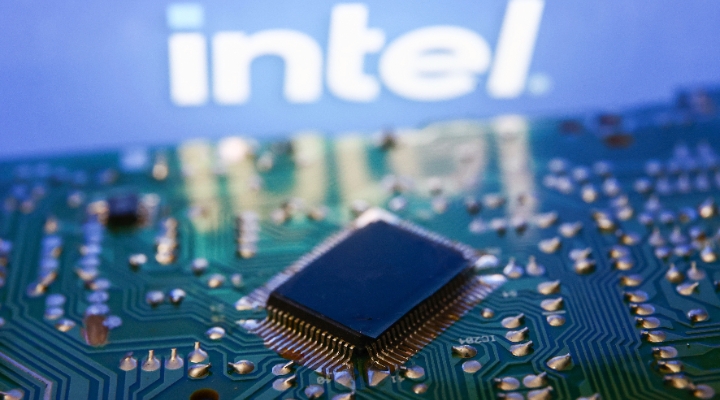
Intel (INTC) may be inside most PCs, but its stock has been left out of the big bull market for semiconductor companies.
Chipmakers like Nvidia (NVDA), Broadcom (AVGO), and Taiwan Semiconductor Manufacturing (TSM) have seen monster rallies over the past year thanks to their foundational role in the artificial intelligence boom. Nvidia is up 200% over the last 12 months, Broadcom 100%, and TSMC 94%. Even a relative laggard in the space, Advanced Micro Devices (AMD), is up 62%. Overall, the Morningstar Global Semiconductors Index is up 109% over the last year.
But Intel has been left out of the party. While the firm is the market share leader in central processing units, it's struggling to keep up with the kinds of semiconductor chips central to AI work, particularly graphics processing units. This year, Intel's stock has fallen nearly 31%, and over the last 12 months, it's up just 8%. In the longer term, the numbers are even more dour: trading near $35 (£26.85) per share, Intel is down 45% from a March 2021 high, and it's never recovered to its dot-com bubble high of $74.88.
"Intel […] has some AI products, but they don't appear to be making much of a dent in the market versus Nvidia," says Morningstar equity strategist Brian Colello. Meanwhile, when it comes to Intel's core personal computer chip business, "Qualcomm [QCOM] appears poised to gain PC processor market share at the expense of Intel."
More broadly, "for several years, Intel has struggled by falling behind the curve on chip manufacturing, moving from a technological advantage over TSMC to a clear technological disadvantage in recent years," Colello says.
"These missteps on the manufacturing front have enabled AMD to gain market share in both PC and server processors."
Key Morningstar Metrics For Intel
• Fair Value Estimate: $30.00;
• Morningstar Rating: 3 Stars;
• Economic Moat: None;
• Morningstar Uncertainty Rating: High;
• Forward Dividend Yield: 1.49%.
Falling Behind During the AI Boom
Intel is a leading digital chipmaker, designing and manufacturing microprocessors for PCs and data center markets. It is well-known for its execution of Moore's Law (the prediction that the number of transistors on integrated circuits doubles about every two years) and the x86 architecture for microprocessors, which is the instruction set for practically all other PCs. During the late 1990s tech-stock boom, Intel was a top performer and dominant name in the industry.
In recent years, however, Intel has lagged behind a changing semiconductor landscape as demand shifted from PCs toward mobile devices and the cloud, and stiffer competition has come for its core business line. While Intel is trying to catch up to Taiwan Semi's manufacturing levels, Colello says that segment is less profitable than expected. Additionally, Intel has developed some AI products, but its efforts are not nearly as vast as those of big names like Nvidia.
Microsoft has backed the "AI PC," which uses Qualcomm's Arm-based processors. "These PCs should gain share over traditional x86 PC processor vendors, mostly Intel (and perhaps, to a lesser extent, AMD). It's possible that Intel catches up in manufacturing, but its various ecosystems shift to chips designed by others," Colello says.
Intel Stock Valuation
Intel's stock is down significantly, but Colello doesn't think it's looking cheap yet. For a bullish outlook, Intel "might improve foundry profitability faster than expected. Perhaps they take a manufacturing process lead after all, maybe demand for PCs with Qualcomm processors will be muted, perhaps Intel finds a couple of large foundry partners to offset any share losses elsewhere," he says. "But our base case assumptions imply that intel is fairly valued, given the various opportunities and threats."
Intel trades at about $33 per share, compared with about $50 at the beginning of the year. Colello says, "the most likely path for upside is if the company can execute on its aggressive advanced manufacturing roadmap," and he thinks it's doing okay in this regard. "If so, there's a path for Intel to slow the bleeding a bit on the PC and server market share front. Also, even if Intel were to lose share in selling chips, there's potential for the company to manufacture these chips for its competitors."
The following are highlights from Colello's current outlook for Intel. The full report is available here.
Fair Value Estimate for Intel
Our fair value estimate for Intel is $30 per share, which implies a 2024 adjusted price/earnings ratio of 30.5 times and a 2025 ratio of 15 times. Intel's revenue fell 14% in 2023, due to a significant pause in PC spending after a couple of strong years of upgrades during the covid-19 pandemic, along with market share losses and more cautious spending among data center customers. We don't foresee a huge rebound in 2024 and model only 1% growth.
On the bright side, Intel should achieve some PC CPU growth in 2024 (we model 4% revenue growth) and expects to earn $0.5 billion in AI accelerator revenue from its Gaudi products. However, spending on server CPUs has been muted as cloud customers have focused their spending on AI accelerators (mostly from Nvidia). Meanwhile, its ancillary businesses will face severe headwinds in telecom spending, which will weigh on overall growth.
Read more about Morningstar's fair value estimate for Intel
Economic Moat Rating
We do not assign Intel a moat. The company's returns on invested capital have fallen in recent years, and the firm did not earn excess returns on capital in 2022, nor do we expect it will do so in 2023. The deterioration stems from the firm's manufacturing struggles and hefty investment phase in new manufacturing processes. We don't believe the company will generate excess returns on capital in the next three to five years (even when considering government subsidies and other incentives). We are also not entirely confident in excess returns on capital looking five to 10 years out if its research and development efforts are not successful, again given the capital-intensive nature of cutting-edge chip manufacturing. If Intel perfectly executes its aggressive technological roadmap, it may warrant a moat in the future. The company is currently on track to do so, but it has stumbled before, and we would like to see further progress before we award it a narrow moat again.
Read more about Intel's economic moat
Financial Strength
Intel is in a difficult financial position, in our view, based on its recent inability to generate free cash flow and its aspirations for hefty capital investments into its next wave of chip manufacturing across the globe. As of March 2024, Intel held $21.3 billion of cash and investments, compared with $52.4 billion of debt. Intel was regularly earning $10 billion-plus of free cash flow per year in its heyday but burned $9 billion in free cash in 2022 and almost $12 billion in 2023. Intel slashed its dividend in 2023 and will pay out about $2 billion in 2024, compared with $5 billion-$6 billion per year in the past.
Read more about Intel's financial strength
Risk and Uncertainty
We assign Intel with a High Uncertainty Rating. The firm continually faces execution risk associated with keeping pace with Moore's Law and creating cutting-edge processors, both in terms of chip design and chip manufacturing. On the latter front, Intel stumbled in recent years, causing the firm to lose market share and suffer notable operating losses. We foresee execution risk associated with Intel's aggressive plans to achieve five processor nodes in four years by the end of 2025.
Read more about Intel's financial risk and uncertainty
Intel Bulls Say
Intel is one of the largest semiconductor companies in the world and holds the lion's share of the PC and server processor markets.
Intel is making some smart moves in its turnaround plans, such as shedding noncore businesses, spinning off shares of its attractive automotive business (Mobileye), and seeking innovative co-investment partnerships with financial firms.
The AI semiconductor market is booming, and Intel is one of the few merchant firms with a diverse enough portfolio to serve a larger portion of the market.
INTC Bears Say
Intel encountered significant manufacturing delays in years past, and there is no guarantee that it can execute well in its aggressive aspirations to develop five process nodes in four years.
Even if Intel can regain manufacturing parity with Taiwan Semiconductor, AMD is currently a far more credible chip designer in the x86 space for PC and server CPUs.
Nvidia’s GPUs have captured most of the AI accelerator market, and cloud computing spending may continue to shift toward these GPUs away from Intel's products over time.






























